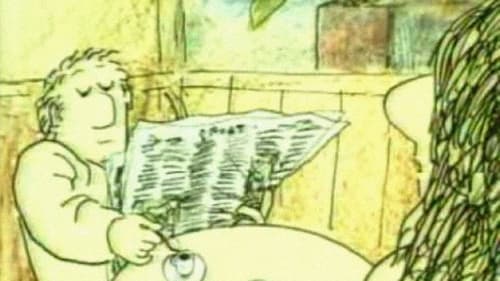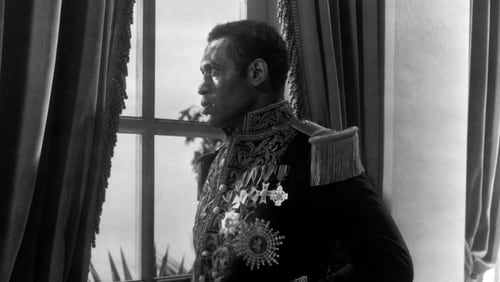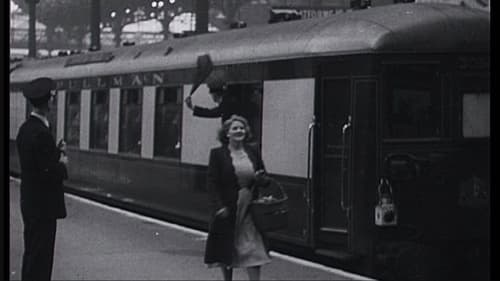A Note from Above (1967)
Gênero : Animação
Runtime : 2M
Director : Derek Phillips
Sinopse
God sends a note to his supporters below, and they obey his every command.

A local occasion filmed at Rapahoe Beach on the West Coast of the South Island.

A mother and her twins talk about each other. The device of miming each others words, gives a disconcerting twist to the children's cruel honesty and their mother's unconditional adoration.

Heretic is a modern dance work by Martha Graham performed to Tetus Breton, an old folk tune from Brittany.

Koko The Clown continually interrupts an animator, who turns his attention to trapping the clown.

A view of the entrance to the Stockholmsutställlningen, the World Exhibition in Stockholm.

A man and a woman converse at a cafe's bar in this animated short.

Boys diving into a river.

A tribute to the courage and resiliency of Britons during the darkest days of the London Blitz.

A send-up of Griffith's THE LONELY VILLA and other movies of that sort, such as THE GIRLS AND DADDY, THE LONEDALE OPERATOR and many others, as the heroine, thinking that burglars are trying to break into her home phones her husband at the office, who rushes home.... well, who tries to rush home in his chauffeur-driven automobile.

"Touches on elemental images; air, water, (and snow), earth and fire (and smoke) all come into it." - MT

Robert Breer’s What Goes Up... continues his “kitchen sink” approach of including as many different kinds of things as possible. Central to his art are a series of tensions. Rather than using animation to produce seamless illusions, his films reveal cinema’s dual nature as both an illusion of movement and a succession of stills. The ultimate effect of his work is ecstatic: by combining various rhythmic patterns, abstract and photographed shapes, and flatness mixed with depth illusions, Breer energizes ordinary eyesight. The whole world can seem more alive, alive with rhythms and colors and shapes and textures as well, after seeing one of his films. But Breer’s films also often have a theme of failure, of failed movements and failed aspirations, and the title What Goes Up..., in referencing the idiom “What goes up must come down”, refers to his childhood dreams of flying (illustrated here as in many of his films with airplanes) as well as to the limpness that follows orgasm for males.

This 1920s home movie, shot by longtime Corpus Christi resident Antonio Rodríguez Fuentes, may well represent some of the earliest produced by a Mexican-American filmmaker about the Mexican-American community in Texas. In the footage, Fuentes captures his five children-Ruben, Ophelia, Mercedes, Antonio, and Carmen-on Christmas Day 1928. The children surround the outdoor Christmas tree, playing with the gifts they received.

A documentary on the miracle which took place in the Usturt Mountains which is now a holy shrine where people go to worship.

The dangers of drinking and driving are illustrated to a teenager returning from a beach party, where after having "one too many beach beers" he runs over a young mother and her child. This black and white short is not to be confused with the later color film, with same title, from 1968 (some sources indicate 1965).

O inescrupuloso e ambicioso, Brutus Jones, escapa da cadeia após matar um guarda e, depois de muita luta, se encontra imperador de uma ilha no Caribe.

A series of images of war and misery.

The practice of Structural/Materialist Film is defined in...process, construction, displaced reflexively...not displaced uniformly into the pattern of a narrative bound up for the stable subject-centred image. Structural/Materialist film has no place for the look, ceaselessly displaced, outphased, a problem of seeing, it is anti-voyeuristic.

(1985) An animated satire on the question of self image for African American women living in a society where beautiful hair is viewed as hair that blows in the wind and lets you be free. Lively tunes and witty narration accompany a quick-paced inventory of relaxers, gels and curlers. Such rituals are all-too familiar to African American women-and indeed to all women confronted with an unattainable ideal of beauty. This short film has become essential for discussions of racism, African American cinema and empowerment. Used by hundreds of groups as diverse as museums, churches, hospitals and hair stylists. (http://www.wmm.com/filmcatalog/pages/c297.shtml)

A short film in which pieces of paper fly off of an animated cube.

London to Brighton in 4 minutes BBC interlude. From the days when TV was all live and programming was hectic. Often when one program finished, the next one was not ready yet, and the gap had to be filled. So the BBC developed a number of interludes to fill these gaps, this being the most famous one.











